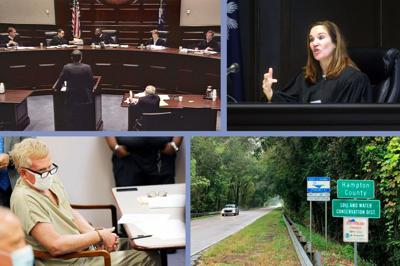Even the best system can’t stop a determined criminal from committing crimes.
But the unfolding Murdaugh saga — from the boat wreck that wasn’t properly investigated to the attempted suicide-insurance scam and now evidence of elaborate extortion schemes — has given even lawyers and judges an uneasy feeling about South Carolina's legal system.
Is the rot confined to one community, one law firm, even one man? Or is this an exaggerated example of the sort of thing that happens throughout a state with an insular network of lawyers and judges — the overwhelming majority of whom attended the same law school, many of whom travel in the same social circles, particularly in smaller communities — where conspiracies can be easily hatched and nurtured?
A Columbia attorney put an exclamation point on that vague feeling of unease on Tuesday, when he made an apparently unprecedented request for Circuit Judge Carmen Mullen to give a deposition in his lawsuit alleging that Alex Murdaugh conspired to steal millions of dollars in insurance money due the sons of his deceased housekeeper, Gloria Satterfield.
Although Eric Bland said he believed Judge Mullen had been misled when she apparently signed an order approving a $2.7 million insurance payment to Ms. Satterfield’s sons and $1.6 million in fees to attorney Cory Fleming, the request raised questions. Why, after recusing herself from the criminal case against Alex Murdaugh's son Paul because of close ties to the family, did Judge Mullen involve herself in the insurance matter? Or did she? Does she usually sign orders when no lawsuit has been filed? At best, that suggests a too casual and trusting approach to her job. Do her orders frequently end up unfiled?
Mr. Bland withdrew his request a day later, saying he had been pressured to drop it, and besides, he had found enough other evidence against Mr. Murdaugh and Mr. Fleming that he no longer needed the judge’s testimony.
We hope that pressure came from lawyers who just don’t like the idea of breaking the tradition of judges speaking only through their court orders, and not from judges who erroneously believed they were protecting the integrity of our judicial system. Because the rest of us still need to hear from Judge Mullen, as the first of many steps to help clear up growing questions about what protections we have to ensure that lawyers are representing the interests of their clients and how we ensure that judges don’t allow their personal relationships with lawyers to cloud their judgment.
We take some comfort in how our criminal justice system has worked since Paul and Maggie Murdaugh’s murders turned the powerful Hampton County family's saga into daily dinner table conversation in South Carolina and beyond: Alex Murdaugh’s law partners say they discovered he was cheating clients and the firm, and forced him to resign; the S.C. Supreme Court suspended his law license; SLED discovered the alleged conspiracy behind his shooting; Mr. Bland unearthed the unfiled legal order that showed the millions owed the Ms. Satterfield's sons, which might never have happened if not for all the publicity; and on Friday, the high court suspended Mr. Fleming's law license, even though he had agreed to give the sons his legal fees, along with payments to come from malpractice insurance.
Yet these appropriate responses have mainly served to highlight deeply disturbing failures. Public confidence is the foundation of our legal system, and its erosion can be cured only through … well, we’re not sure what at this point.
The S.C. judiciary has some serious soul searching to do, and the Legislature has some serious questions to ask. That will not be quick or easy work, because there’s no obvious solution. At this point, we don’t really even know how big the problem is.
But we know it can only be resolved through the sort of transparency that our court system seems determined to guard against, with its secretive attorney and judicial disciplinary systems and the judicial code of silence. The healing starts with Judge Mullen subjecting herself to a public questioning about what she knew and didn’t know and what was routine and out of the ordinary about how she handled this bizarre case. The S.C. Supreme Court needs to find a way to both allow and require her to do this, and sooner is better than later.












